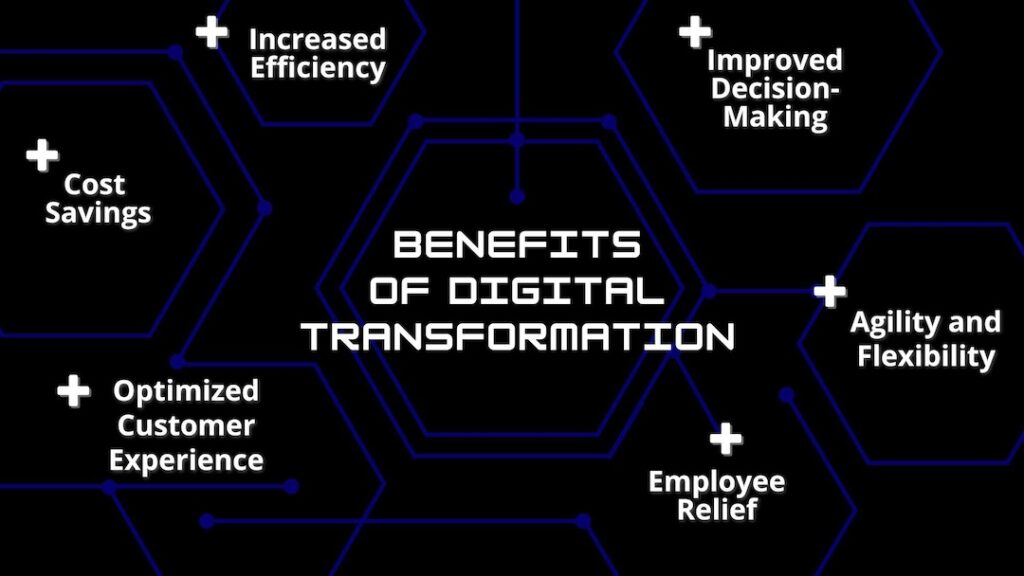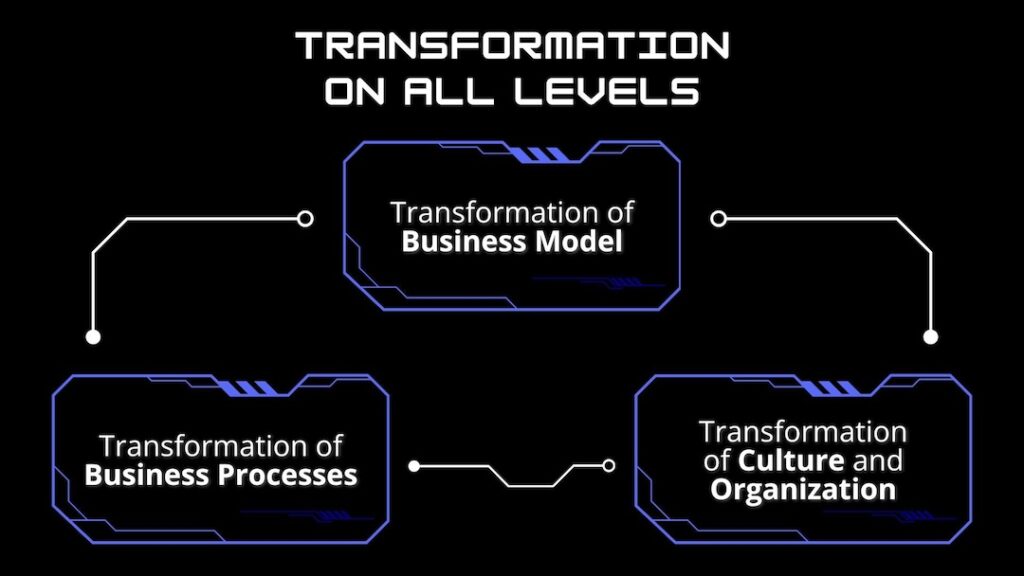Digital transformation is a central process in the modern business world, where digital technologies are comprehensively integrated into all areas of a company. This means far more than just using new tools – it requires a profound rethinking of business models, operational processes, and the customer experience.
The goal of digital transformation is to make companies more efficient, adaptable, and competitive. Given the rapid pace of technological change, the ability to digitally transform is crucial for long-term survival and success in the market.
The following article provides a comprehensive overview of the areas digital transformation encompasses in companies, the benefits and challenges it entails, and why the healthcare sector plays a crucial role in the course of digital transformation.
Definition: What does Digital Transformation mean?
In the context of digitization, the term digital transformation describes the process of integrating digital technologies into all areas of a company. It is a holistic rethinking of how business models, operational processes, and customer experiences can be digitally reshaped to generate revenue and increase efficiency within the company.
All of this serves to adapt companies to the constantly changing digital landscape, leading to fundamental changes in how companies operate and provide value to their customers. These changes are necessary to withstand digitalization and remain competitive and resilient in the market.
Companies that fail to develop in this area will be left behind in the medium to long term. A recent Bitkom study confirms this picture: Seven out of ten German companies perceive that, due to digitization, companies from other sectors, including the IT and internet industry, are entering their market. Established companies and corporations must keep up to avoid losing ground.
This is precisely why today it is not about the “if” but about the “how” when we talk about digital transformation.
6 Benefits of Digital Transformation for Companies
Digital transformation is an unstoppable development that companies must embrace to remain competitive. Beyond that, it brings additional advantages for businesses.

1. Increased Efficiency and Productivity
By automating business processes and utilizing digital tools as part of the digital transformation strategy, companies can significantly enhance their efficiency and productivity. Routine tasks can be automated, freeing up more time for employees to focus on strategic tasks.
2. Improved Decision-Making through Data Analysis
Digital transformation enables companies to collect and analyze large amounts of data. By leveraging big data and advanced analytics tools, companies can make informed decisions based on real-time information and precise data analyses. This leads to better business outcomes and a stronger competitive position.
3. Optimized Customer Experience
Through the use of digital technologies, companies can provide personalized and seamless customer experiences, increasing satisfaction and strengthening loyalty. Companies can better understand customer needs and respond more quickly to inquiries and feedback, resulting in an optimized customer experience.
4. Cost Savings
The digitization of business structures and processes can lead to significant cost savings by eliminating inefficient processes and reducing operational expenses. Automated systems decrease the need for manual interventions and reduce errors, leading to lower operating costs. Cloud computing solutions allow companies to reduce IT infrastructure costs and utilize scalable resources as needed.
5. Increased Agility and Flexibility
Digital technologies enable companies to respond quickly to market changes and customer demands. Agile methods and flexible work models can be more easily implemented, increasing adaptability and innovation. This helps companies to adapt quickly in a dynamic market environment and seize new business opportunities.
6. Employee Relief
As part of digital transformation, repetitive and time-consuming tasks are automated, leaving more time for creative and strategic activities. Communication and collaboration tools make teamwork more efficient and flexible. Remote work and flexible working hours are enabled by digital technologies, improving work-life balance. Additionally, digital processes reduce errors and increase accuracy, which lowers stress and workload for employees.
All these benefits of digital transformation ensure that companies stay up-to-date, can serve customers and their needs appropriately, and strengthen their competitiveness in the market through flexibility, cost reduction, and increased efficiency.
Furthermore, it should not be forgotten that digitization and digital tools are crucial means to attract and retain skilled professionals in the war for talent. Young target groups, in particular, demand modern, efficient work structures.
Transformation on all Levels
A successful digital transformation strategy is comprehensive and changes the entire company across almost all areas and processes.

Transformation of the Business Model
This step is perhaps the most far-reaching and the most challenging for management to implement: the transformation of the business model. Digital transformation also means adjusting the actual business model – digital business models are the keyword here.
According to the aforementioned Bitkom study, nearly half of the companies find this step very difficult. Yet digital products and services are an essential part of our world, and revolutionizing traditional business models is inevitable, even if it’s challenging.
One of the more prominent examples of large companies not shying away from digital transformation is Netflix. Over 25 years ago, the current streaming service started with a DVD rental service, where DVDs were mailed to customers. Netflix only closed this business segment for good in 2023. But as early as 2007, the company digitized its business model by allowing customers to stream movies and series online – long before Amazon Prime Video or Disney+. A digital transformation of the business model that Netflix would not have survived over time if not implemented.
Transformation of Business Processes
The transformation of business processes involves the adjustment or redesign of those workflows through the use of digital technologies.
This includes automation of tasks using Robotic Process Automation and workflow automation to perform repetitive and rule-based activities more efficiently. Data analytics and business intelligence are used to monitor business processes and make data-driven decisions, while methods like Lean Management and Six Sigma contribute to process optimization. Additionally, technologies such as cloud computing, the Internet of Things, modular IT systems, customer relationship management systems (CRM), and cybersecurity measures are part of this transformation.
Transformation of Culture and Organization
This aspect is often underestimated, but it is crucial for the long-term successful implementation of the digital transformation strategy. The transformation of culture and the entire organization focuses on the employees. They must not be overlooked during the digital transformation and simply confronted with new technologies and systems.
To include them in the process, intensive communication between the workforce and the management is important. Employees need to understand why workflows and processes are being changed and what the long-term benefits are – only then can they embrace the change.
Employees are ultimately the ones who, through their actions, significantly determine whether a strategy is successful or not. If they feel overlooked, it can block the implementation or even lead to turnover. Therefore, continuous communication with employees is essential, as well as training to prepare them for new technologies and systems.
The Challenges of Digital Transformation
Implementing a digital transformation strategy also brings several challenges. The following five are the most commonly observed in companies.
1. Resistance to Change from the Workforce
Employees, including managers, are accustomed to existing ways of working and are often skeptical of new technologies. Resistance from the workforce to the implementation of new processes and technologies is common. We have already mentioned this issue in the context of transforming corporate culture. This resistance is not entirely unfounded – it can stem from fear of the unknown, concerns about job security, or a lack of understanding of the need for change. Transparent communication from management is essential in this regard.
2. Lack of Digital Skills and Talent Shortage
Digital transformation requires new skills and knowledge. However, many employees do not have the necessary digital competencies to effectively use the new technologies – these skills need to be learned. Therefore, as part of a digital transformation strategy, (extensive) training and development programs are crucial to prepare the workforce for the digital future. This is particularly important as the competition for digital talent is intense, making it difficult to recruit qualified professionals.
3. Complex Integration of New Technologies
Implementing new technologies is often complex and time-consuming. Existing systems and processes must be adapted or completely replaced, which requires investment and careful planning – especially since old systems are typically not tailored to new requirements. The integration of data from various sources and ensuring the interoperability of new and old systems are additional challenges that require technical expertise and strategic management.
4. A New Standard for Cybersecurity
With digitization, the risks of cyberattacks and data breaches increase. Companies must develop robust security strategies to protect their digital assets. This includes implementing modern security technologies, providing regular training for employees, and complying with legal data protection regulations. Security concerns can also affect the trust of customers and business partners, necessitating additional precautions.
5. New Customer Expectations and Changing Market Dynamics
Customer needs and expectations are constantly evolving, and companies must be able to respond quickly to remain competitive. While digital transformation offers the tools to better meet customer demands, it also presents the challenge of using these tools effectively. Companies must continuously review and adapt their business models to meet changing market demands.
The Most Important Tools and Technologies for Companies
As part of digital transformation, companies employ a variety of technologies to optimize their business processes, improve customer experience, and stay competitive. Here are some of the key technologies that should be known and implemented where possible in the context of digital transformation:
- Cloud Computing allows companies to forgo operating their own physical servers, providing flexibility, scalability, and cost efficiency.
- Artificial Intelligence and Machine Learning revolutionize many business areas by analyzing data, recognizing patterns, and making predictions.
- The Internet of Things refers to the networking of physical devices and is applied in areas such as Industry 4.0, healthcare, transportation, and many other sectors.
- Big Data technologies enable the collection, storage, and analysis of large amounts of data. By using advanced analytics tools, companies can gain valuable insights that improve business processes, develop new products, and optimize the customer experience.
- Blockchain technologies offer a decentralized and secure method for recording transactions, for instance, in finance, supply chain management, and smart contracts.
- Robotic Process Automation allows for the automation of repetitive and rule-based tasks through software robots.
- Cybersecurity technologies such as firewalls, encryption, intrusion detection systems, and endpoint security solutions are crucial to protect a company’s digital assets. Additionally, quantum cybersecurity promises even more robust protection mechanisms against future threats through the use of quantum encryption and algorithms.
- Augmented Reality and Virtual Reality provide immersive experiences and are used in various industries, including retail (virtual try-ons), education (virtual classrooms), and manufacturing (simulation and training).
Industry Focus: Digital Transformation in Healthcare
Amid the wave of digitization and digital transformation, one sector stands out in particular: healthcare. For several years, the so called “Krankenhauszukunftsgesetz für die Digitalisierung von Krankenhäusern” (KHZG) has been in place to digitalize hospitals, aiming to prepare them for the digital age. At the end of 2023, the German Bundestag also passed the so called “Digital-Gesetz” (DigiG) and the so called “Gesundheitsdatennutzungsgesetz” (GDNG) to further advance digitization in this area.
The digital transformation of healthcare primarily focuses on the following areas:
- Faster and more efficient communication and administrative processes,
- Digital provision of patient data (electronic health records),
- Systematic analysis of medical data to improve disease detection and personalized therapy.

Digital Health – The Transformation of Healthcare
The digital transformation in healthcare is of particular importance as it has the potential to fundamentally change and improve the way medical services are delivered.
Additionally, the general benefits of digital transformation also apply to healthcare: Technologies such as electronic health records, telemedicine, and mobile health applications enable continuous and personalized patient care, leading to better health outcomes and an optimized patient journey. This, in turn, increases efficiency, reduces costs, and ensures the care of more patients.
Given the shortage of skilled healthcare professionals, digital transformation in healthcare is indispensable. While the current care shortfall is around seven percent in Germany, it is expected to rise to approximately 35 percent by 2035 – equivalent to nearly 1.8 million vacant positions.
Telemedicine is a particularly interesting mobile health solution as it improves access to medical services, especially in remote or underserved areas. This helps reduce health disparities and enhances healthcare delivery in rural and remote regions. Big data and data analytics also enable the collection and analysis of large volumes of health data, helping healthcare providers make informed decisions, identify patterns and trends, and improve the quality of care.
Digitalization in Healthcare: The Example of Sana Kliniken
As a Digital Advisor, I have focused on the digital transformation of the healthcare sector over the past few years and have been working with Sana Kliniken for some time now. Since July 2024, I have been the Managing Director of Sana change it!, which is entirely dedicated to the effective transformation of the clinic group. Additionally, I continue to be invested as an Early Stage Investor in exciting tech startups. This way, I can combine two of my passions: digital transformation and the startup scene. This combination often results in great synergies.
But let’s start from the beginning. To address digitalization, I have been dedicating my efforts to the intersectoral management system (SIMS) for Sana Kliniken. This involves developing a new, digitized hospital information system that meets the requirements of our times.
The goal of this project is to develop a future-proof, practical state-of-the-art software that delivers a reliable patient promise and a modern working environment. Until now, there has been a lack of such a contemporary and functional software solution in the German-speaking region.
But why is that? Despite the extensive healthcare coverage in Germany, the healthcare sector lags two decades behind the industry’s level of digitalization. The basic infrastructure in most clinics and practices is outdated. The enormous potential of digital technologies has not been fully exploited in healthcare. Specifically, the current practice management systems and hospital information systems are not up to date with modern standards.
To address these challenges and make a significant step towards the digitization of healthcare, we developed SIMS for Sana Kliniken. SIMS aims to closely integrate the outpatient and inpatient care of Sana Kliniken and gradually replace other outdated systems. While the technical requirements are crucial, the primary focus of the system is to comprehensively improve the needs of employees and patients.
To develop SIMS as a foundational product and realize this groundbreaking vision of Sana Kliniken, a strong partner for the healthcare provider was needed. A motivated development team from the startup scene has been working with Sana Kliniken in joint, operational tasks, and I am excited about how quickly synergies between an established corporation and a rising startup have emerged. SIMS was not built from scratch but was developed into its own intersectoral management system based on an existing platform.
SIMS is part of an extensive digital transformation strategy at Sana Kliniken. Not only technical adjustments are necessary to make the hospitals fit for the future, but also standardized processes and a stronger focus on patients and employees. This transformation aims to not only increase the efficiency of Sana Kliniken but also improve the quality of care and enhance employee satisfaction. Following a pilot phase, the company-wide rollout of SIMS is scheduled to begin in 2024.
Sana Kliniken demonstrate through this project that digital transformation in healthcare is important and feasible, despite its challenges. With this project, the healthcare provider is venturing into new territory. Sana Kliniken are thus taking the lead in an industry characterized by old structures and processes.
Conclusion
Digital transformation is more than a technological necessity; it is the key to future-proof growth and sustainable success. Companies that have the courage and vision to fully integrate digital technologies will not only become more efficient and competitive but also better able to meet the needs of their customers.
However, this requires a rethinking at all levels – from business models to processes to corporate culture. The challenges are real, but the benefits far outweigh them.
Those who invest in digital transformation today are laying the foundation for a dynamic and innovative future.

Hi! I’m Oliver Weimann and I’ve been an active driver of the German startup scene for over 15 years. As a serial entrepreneur and digital advisor, my professional focus is on the development and optimization of digital business models. Additionally, cybersecurity is one of my areas of expertise. Feel free to contact me if you have any questions!
